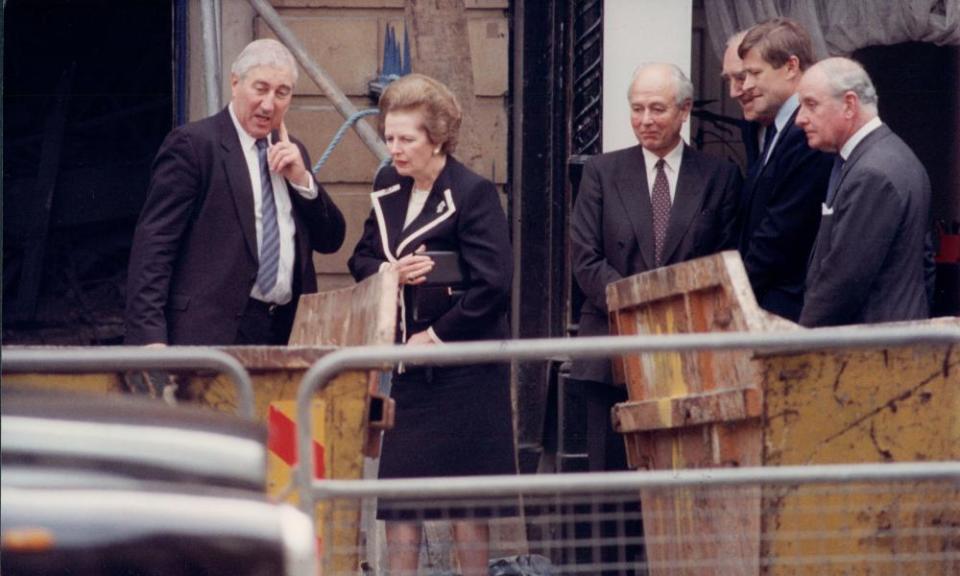Whatever the rhetoric, Masood was just a deluded loser

You know what Margaret Thatcher would have said about Westminster Bridge. She’d have delivered her “oxygen of publicity” diatribe. She’d have told assembled editors that reporting terrorist atrocities – spreading fear and alarm – was doing the terrorists’ job for them. We once pondered the problem of a Belgrave Square bomb blanketed in silence. It would have been the same for parliament’s gates. (Oh, and turn off the sound when Martin McGuinness does a TV interview.)
Like many effusions from Mrs T, this was all a tad overdone, not to say ludicrous. How could the massed ranks of media pretend that central London wasn’t a chaos of gridlock and screaming ambulances? But there was – and always is – a countervailing argument for balance and self-restraint. Silence is one thing; hysteria is quite another.
How did Wednesday’s horrors fare, then? They could naturally be portrayed as an attack on democracy. Prime-ministerial speechwriters and legions of editorialists took care of that. Parliament found a residual well of goodwill. But – with Millbank’s TV studios only a few metres away, the new New Scotland Yard a few strides in the other direction and dozens of political journalists looking down from their offices – there was also an obvious risk of airwaves overdose. Throw in the HQs of MI5 and MI6 just down the road and this was an actual metropolitan media bubble.
Dozens of tweeters seemed to register that special status almost instinctively. The pleas not to exaggerate or show death agonies came thick and heartfelt. But there was a real problem: too many MPs and journalists, swarming all over the scene. Every one had their story to tell, even if it was much the same as the one before. Everyone felt to some extent part of the story.
Meanwhile there were curiously few pictures to go with the words: the same bodies being loaded on to ambulances, the same middle-aged terrorist breathing his last. So the snatched images of total distress came round and round again. And oxygen? Available in abundance. The sheer volume of coverage saw to that. Of course, in the real post-Thatcher world of 24/7 news and Facebook, that was inevitable. But you still felt the lack of a guiding production hand. You still turned to channels with rather fewer resources to worry about.
For hydrogen – the gas that fills balloons – is also a problem here. I’m a long-term Londoner too. We can set the strength of history and 8.6 million souls against murderous rampages. Emotion natural and guaranteed. But if we’d seen what a pathetic loser Khalid Masood seemed to be, would we have dignified him by lofty rhetoric? The bridge was yet another brutal, grisly incident inflicted by a handful of deluded inadequates. It’s not Agincourt or the blitz. And perhaps Thatcher would have been right if in the end if she’d tried to make us see that.
Life and death in Dublin and London
From terrorism present to terrorism past. You may naturally agree with the Daily Mail that “Our world is cleaner without this butcher.” Indeed, you can let the Mail’s bitter obsequies for Martin McGuinness run on and on. “In a tweeted eulogy, Mr Blair’s liar-in-chief, Alastair Campbell, describes the Bogside Butcher as a ‘great guy’. Try telling that to the widows, orphans and maimed he leaves behind in the province he terrorised.”
But before agreeing too enthusiastically, turn to the Irish Daily Mail on the day after his death. Mail London has some blood-soaked old pictures of Guildford and Enniskillen on its front page. Mail Dublin has a glowing picture of the young McGuinness and the legend “Brought Home”.
And Sun lovers, unsurprisingly, will find exactly the same gambit on display. Here’s the Irish version with the headline, “It’s not how you begin… it’s how you end”, plus a winsome young portrait of McGuinness and an image of him shaking hands with Queen.
Meanwhile the word from Bun Central is encapsulated in one word, “Unforgiven”. Apparently, “the Sun will not join in the revolting orgy of pious praise for Martin McGuinness. It sickens us to hear so many people casually downplaying the psychopathic evil of his campaign of murder, to talk up the good he belatedly did.”
Much of the same shifting was on display a few days ago over indyref2. Print principles turn turtle when they reach Berwick-upon-Tweed. But the McGuinness cavortings go lower than that: on matters of life, hope, death and sorrow. OK: there are degrees of editorial separation here. But who says high-minded rage matters a damn when it dips its toes in the Irish Sea?

 Yahoo News
Yahoo News 